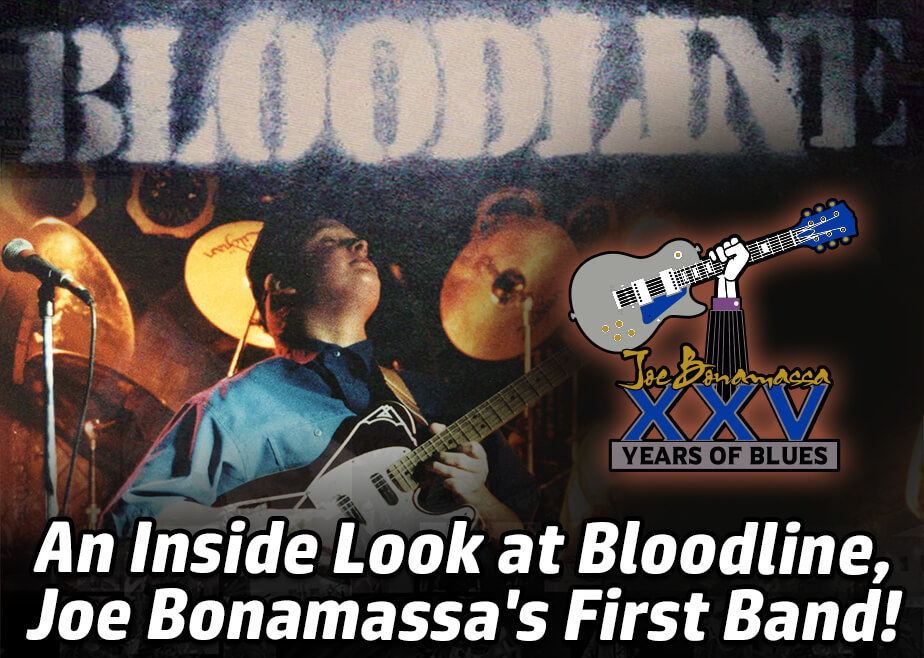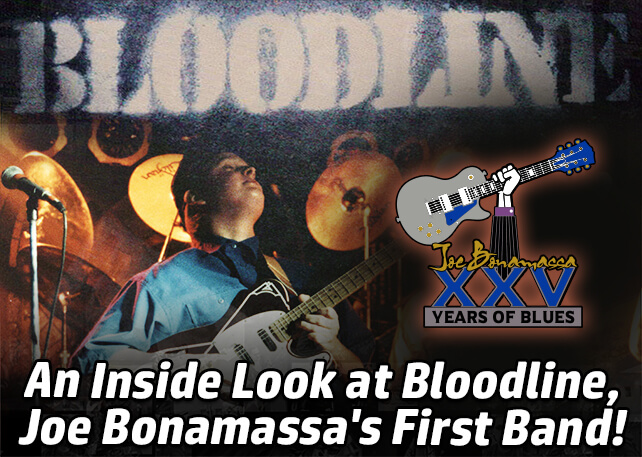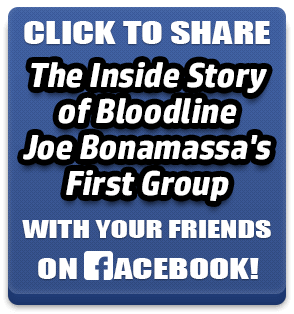



The Story of Bloodline,
Joe Bonamassa’s First Band

When Joe was turning 13 years old, he was a hot music industry commodity. His stint opening for B.B. King was catapulted into a story on NBC’s Real Life with Jane Pauley that featured Joe as an exciting young guitar prodigy, causing potential managers to descend upon the youthful virtuoso. Joe signed with Premier Artists, where Joe’s longtime manager Roy Weisman worked, and the agency was thrilled to have Joe on board. Not only were they blown away by his obvious talent, but the music industry was burning for new youthful talent in the wake of the success of teen idols New Kids on the Block. Not only that, but the young guitarist had been endorsed by B.B. King himself! Premier Artists immediately began shopping this extraordinary prodigy for a record deal with all of the major labels, assuming that the labels would also see Joe Bonamassa as a no-brainer decision and be quick to sign him. But it didn’t turn out that way. While they were all obviously very impressed by his immense guitar talent, at this point in his young career Joe did not write songs and he did not sing. As a result, the major labels didn’t think there would be a market for Joe, and one by one the record companies and their A&R people turned Joe down. Stunned and disappointed by the failure of the labels to sign Joe, Premier Artists was sent back to the drawing board on how to harness Joe’s immeasurable talent.
As Joe was turning 14 years old, he became the youngest kid in the history of the Fender Musical Instruments Corporation to receive an endorsement. As a result, he received a new Eric Clapton model Stratocaster – Clapton, of course, was one of Joe’s musical heroes. He was also invited to a special tribute concert to Leo Fender, who had just recently died on March 21, 1991. The concert was being held in California, so Joe flew out there for the occasion. One of the bands performing at the Fender tribute show was the Robby Krieger Band – Krieger, of course, was the former guitarist of The Doors. Members of the band included Krieger’s son Waylon – who was not present that day – as well as the son of legendary Allman Brothers Band bass player Berry Oakley, Berry Oakley, Jr. The young Bonamassa was extremely impressed by Oakley, Jr.’s powerful, deep, heavy bass playing. Joe and Premier had already thought about the idea of building a band around Joe as a way to re-market him to the major labels, so Joe approached Oakley, Jr. about playing in a band with him. Not only was Oakley interested, but he suggested his bandmate in the Robby Krieger Band, Waylon Krieger, as a rhythm guitarist. With Krieger on board, the upstart band just needed to find themselves a drummer. Miles Davis had just recently passed away, and Krieger’s agent was aware that Davis’ son, Erin Davis, was a drummer. The idea of a kind of “sons of famous musicians” band began to form, and so they got in touch with Davis. Davis came to a band rehearsal and was impressed by what he heard. He was in. The band recruited another upstate New Yorker – Joe was from Utica - in Lou Segreti to play keyboards, and now they just needed a name. In tribute to the fact that three of the band’s members were the sons of musical icons, the name “Bloodline” was chosen. Thus, Bloodline was born.
Premier Artists was excited to have Bloodline on board, and reached out to legendary producer Phil Ramone to give his expert opinion on the group. Ramone’s producing credits include albums by Burt Bacharach, Paul Simon, Billy Joel, Quincy Jones, Chicago, Simon & Garfunkel, Ray Charles, The Carpenters and more. Ramone attended a Bloodline rehearsal in Los Angeles and definitely believed the band had strong potential. As a result, the band spent over a year making demo recordings and shopping them to the major labels. This strategy bore fruit, and they were soon signed to EMI and releasing their first record. The record did well and produced a hit single called “Stone Cold Hearted” which made it to #32 on the Billboard Mainstream Rock Tracks chart. They also opened for a Lynyrd Skynyrd / Tesla tour and booked some television spots.
All seemed to be going well, but at the end of the promotion cycle for the Bloodline album, the band experienced some internal strife. Wanting to change direction from the blues-rock of their first record to the alternative rock that was now dominating the rock charts, Bloodline decided they wanted to move on – without Joe Bonamassa. Members of the band approached Roy Weisman about this. Weisman understood, thanked the band very much for their time, but said he was also going to move on too – with Joe. At this time, Joe was 17, already close to 18, and Weisman broke the news to Joe about the developments with Bloodline over the phone, feeling badly. Joe had devoted quite a few years to this band, missed most of his high school career, bringing a tutor on the road with him for their extensive touring. But Weisman had faith in Joe, and told Joe that whatever he wanted to pursue – jazz, fusion, a year off, whatever – Weisman would support him. Joe understood.
A few weeks later, Weisman received a package in the mail. It was from Joe. Roy tore it open and found a demo tape inside. There was a handwritten note attached to it. “This is me trying to sing. – Joe.” Roy popped in the demo, and began to sense the future…
Stay Tuned for future editions of The JB 25th Anniversary Chronicles













